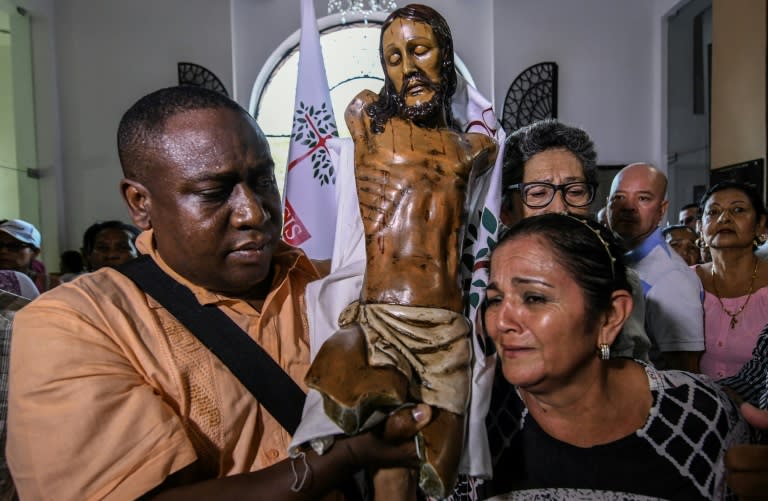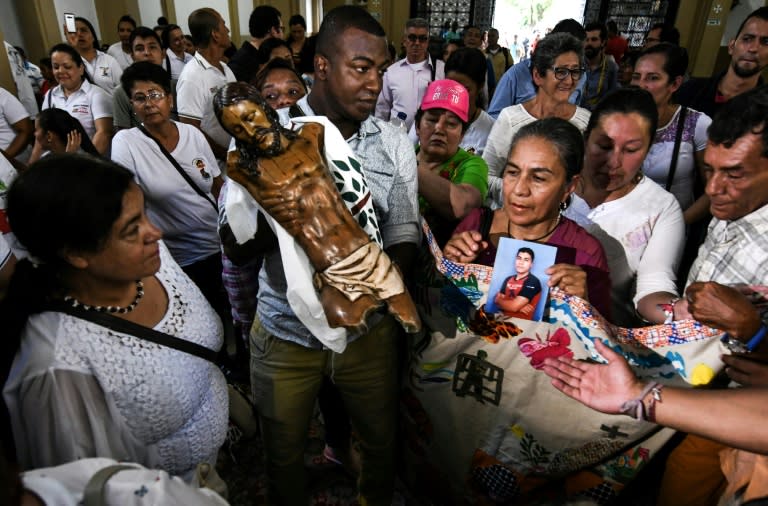Pope to bless maimed Christ, symbol of Colombia war
Like others receiving papal blessings this week, he has lost limbs and is scarred by shrapnel. But this figure is made of plaster -- a unique symbol of Colombia's civil conflict. His pained grimace and the blood on his brow were sculpted and painted in devotion, but the violence that maimed the limbs of the Christ of Bojaya was real. The statue hung on a crucifix in a church in that western town until a bombing by FARC guerrillas reduced it to a dismembered torso. The blast killed 79 people sheltering in the building. Now massacre survivors and relatives of those killed have spent three days bringing the Christ to the city of Villavicencio to be blessed by Pope Francis when he visits on Friday. "The Christ represents what happened to all the people who died," one of their leaders, Luz Marina Canola, 55, told AFP, after arriving with the figure at Villavicencio's cathedral on Thursday. - Rural suffering - Beyond the many sufferings of war, the Christ of Bojaya reflects the particular ordeal of poor rural communities in Colombia's half-century conflict. Some 60 indigenous guards came to Villavicencio from around the country to provide symbolic protection for the statue -- and to meet the pope. Leaders from 11 indigenous tribes formed a corridor of honor with their ceremonial rods as the Christ approached the altar. A female choir from Bojaya, led by Canola, sang to welcome the Christ to the cathedral in Villavicencio, gateway to the war-scarred eastern plains. "This has gone down in history and will never be forgotten," they sang. "Armed groups, don't come here anymore." Bojaya parish priest Alvaro Hernan Mosquera led the procession that brought the statue to Villavicencio by boat, road and air. "This is a way of showing what Bojaya was and is, and that there is hope for a land of peace, harmony, coexistence and reconciliation," he said. - Guerrillas apologize - A year ago, in a private ceremony, the Revolutionary Armed Forces of Colombia (FARC) apologized to the people of Bojaya for the 2002 massacre. The FARC have since disarmed and transformed into a political party under a peace accord with the government. Canola's choir sang at the ceremony marking the signing of that accord in September 2016. But weeks later, Colombian voters narrowly rejected the accord in a referendum that the government had hoped would be just a formality. Francis tried unsuccessfully to mediate, as critics insisted the FARC rebels got off too lightly with amnesties and alternative sentences. The sides redrafted the accord and the government pushed it through congress. In the Bogota capital on Thursday, Francis urged Colombians to forgive and reconcile as they seek a lasting peace. The Bojaya survivors echoed that call. "We have to put ourselves in the other person's shoes," said Canola. "If we do not forgive, we cannot be reconciled." - Pope's blessing - On Friday, Francis will hold a mass in Villavicencio for victims and perpetrators of atrocities in the conflict. With the Bojaya Christ hanging over the cathedral altar on Thursday, Canola sang a song composed by the choir especially to thank the pope for coming. "I believe that the pope's blessing of the Christ gives more strength to us and to the Christ to keep on with the struggle," said one of the singers, Ereiza Mosquera, 59. "We will keep singing until the whole world says: no more (war)."



